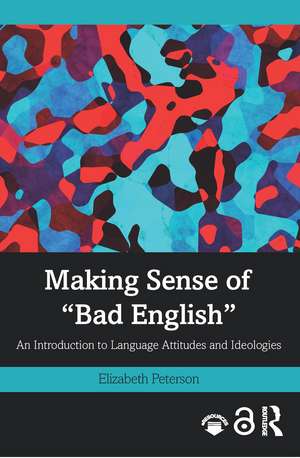Making Sense of "Bad English": An Introduction to Language Attitudes and Ideologies
Autor Elizabeth Petersonen Limba Engleză Paperback – 31 oct 2019
Features include:
- an overview of attitudes towards English and how they came about, as well as real-life consequences and benefits of using "bad" English;
- explicit links between different English language systems, including child’s English, English as a lingua franca, African American English, Singlish, and New Delhi English;
- examples taken from classic names in the field of sociolinguistics, including Labov, Trudgill, Baugh, and Lambert, as well as rising stars and more recent cutting-edge research;
- links to relevant social parallels, including cultural outputs such as holiday myths, to help readers engage in a new way with the notion of Standard English;
- supporting online material for students which features worksheets, links to audio and news files, further examples and discussion questions, and background on key issues from the book.
| Toate formatele și edițiile | Preț | Express |
|---|---|---|
| Paperback (1) | 295.16 lei 3-5 săpt. | +18.32 lei 6-12 zile |
| Taylor & Francis – 31 oct 2019 | 295.16 lei 3-5 săpt. | +18.32 lei 6-12 zile |
| Hardback (1) | 763.35 lei 6-8 săpt. | |
| Taylor & Francis – 29 oct 2019 | 763.35 lei 6-8 săpt. |
Preț: 295.16 lei
Nou
Puncte Express: 443
Preț estimativ în valută:
56.48€ • 60.40$ • 47.09£
56.48€ • 60.40$ • 47.09£
Carte disponibilă
Livrare economică 27 martie-10 aprilie
Livrare express 12-18 martie pentru 28.31 lei
Preluare comenzi: 021 569.72.76
Specificații
ISBN-13: 9781138237476
ISBN-10: 1138237477
Pagini: 190
Ilustrații: 1 Tables, black and white; 13 Line drawings, black and white; 15 Illustrations, black and white
Dimensiuni: 156 x 234 x 17 mm
Greutate: 0.34 kg
Ediția:1
Editura: Taylor & Francis
Colecția Routledge
Locul publicării:Oxford, United Kingdom
ISBN-10: 1138237477
Pagini: 190
Ilustrații: 1 Tables, black and white; 13 Line drawings, black and white; 15 Illustrations, black and white
Dimensiuni: 156 x 234 x 17 mm
Greutate: 0.34 kg
Ediția:1
Editura: Taylor & Francis
Colecția Routledge
Locul publicării:Oxford, United Kingdom
Public țintă
UndergraduateCuprins
List of illustrations; Acknowledgements; Rationale for this book; Terminology used in this book; Introduction to Part 1: Making sense of "Bad English"; Chapter 1. English speakers in outer-circle and expanding-circle settings; Chapter 2: Where does "Good English" come from, and what does it have to do with Santa Claus?; Chapter 3. "Bad" English in inner-circle settings; Chapter 4. How "Bad English" works against us: linguistic discrimination in the USA; Chapter 5: Why does "Bad English" still exist?; Introduction to Part 2; Chapter 6: Acquisition of English as a mother tongue; Chapter 7: African American English; Chapter 8. Competing explanations for linguistic features in the outer circle; Chapter 9: English as a lingua franca; Summary of Part 2 ;Chapter 10. Conclusions; Bibliography; Index.
Notă biografică
Elizabeth Peterson is an Associate Professor at the University of Helsinki, Finland.
Recenzii
"Enormously fascinating to anyone with an interest in varieties of English (dialects, accents, styles) as they are spoken, natively and non-natively, around the world; and endlessly helpful in the fightback against the benighted ones who attempt to shame their fellow human beings for the way they speak."
Peter Trudgill, University of Fribourg, Switzerland
"Perceptions of "good" and "bad" English are a major issue for language users, but vary in different nation states. Such ideologies and their social consequences have been examined by sociolinguists in monolingual and to a lesser extent well-established bilingual English-speaking communities. However, the perspectives of millions of speakers and writers world-wide for whom English is a lingua franca have been largely ignored. Elizabeth Peterson’s book is therefore timely, and particularly valuable in connecting English speakers from all types of language community with the ideologies which emerge from different histories and social contexts. It will be useful both as an undergraduate teaching tool and as a resource for researchers."
Lesley Milroy, University of Michigan, USA
"As the author says, the purpose of her book is not one of proselytism or conversion; rather, she has tried to make the reader think more carefully about language before labelling it ‘bad’. In using a multi-layered approach, along with an easy-to-read style, Elizabeth Peterson has easily accomplished the goal of making ‘bad English’ make sense. Ultimately, though, she leaves it to the reader to decide"
Hiram L. Smith, Journal of Multilingual and Multicultural Development, USA
Peter Trudgill, University of Fribourg, Switzerland
"Perceptions of "good" and "bad" English are a major issue for language users, but vary in different nation states. Such ideologies and their social consequences have been examined by sociolinguists in monolingual and to a lesser extent well-established bilingual English-speaking communities. However, the perspectives of millions of speakers and writers world-wide for whom English is a lingua franca have been largely ignored. Elizabeth Peterson’s book is therefore timely, and particularly valuable in connecting English speakers from all types of language community with the ideologies which emerge from different histories and social contexts. It will be useful both as an undergraduate teaching tool and as a resource for researchers."
Lesley Milroy, University of Michigan, USA
"As the author says, the purpose of her book is not one of proselytism or conversion; rather, she has tried to make the reader think more carefully about language before labelling it ‘bad’. In using a multi-layered approach, along with an easy-to-read style, Elizabeth Peterson has easily accomplished the goal of making ‘bad English’ make sense. Ultimately, though, she leaves it to the reader to decide"
Hiram L. Smith, Journal of Multilingual and Multicultural Development, USA
Descriere
Making Sense of "Bad English" is an accessible introduction to attitudes and ideologies towards the use of English around the world. The book provides an engaging and thought-provoking overview of this topic and is essential reading for any student studying sociolinguistics within a global setting.
